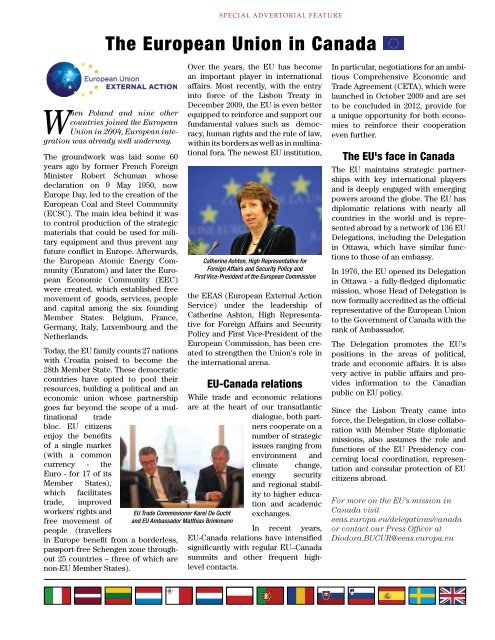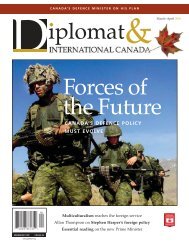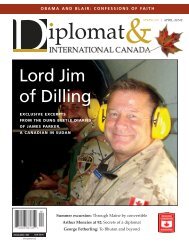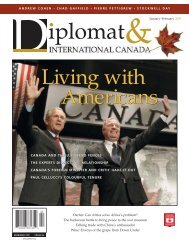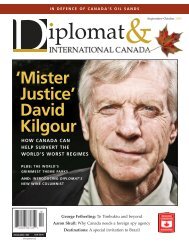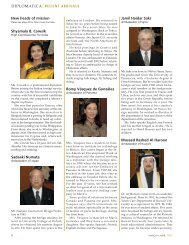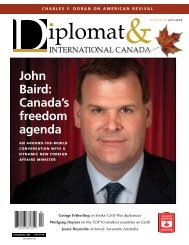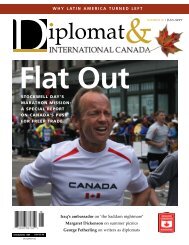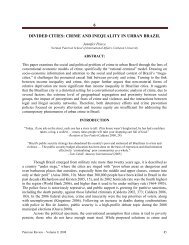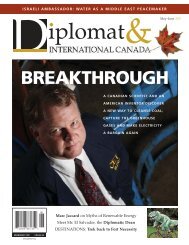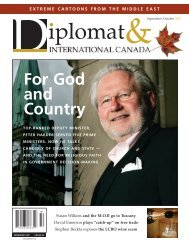the new petro power paradigm - Diplomat Magazine
the new petro power paradigm - Diplomat Magazine
the new petro power paradigm - Diplomat Magazine
You also want an ePaper? Increase the reach of your titles
YUMPU automatically turns print PDFs into web optimized ePapers that Google loves.
Special Advertorial Feature<br />
The European Union in Canada<br />
When Poland and nine o<strong>the</strong>r<br />
countries joined <strong>the</strong> European<br />
Union in 2004, European integration<br />
was already well underway.<br />
The groundwork was laid some 60<br />
years ago by former French Foreign<br />
Minister Robert Schuman whose<br />
declaration on 9 May 1950, now<br />
Europe Day, led to <strong>the</strong> creation of <strong>the</strong><br />
European Coal and Steel Community<br />
(ECSC). The main idea behind it was<br />
to control production of <strong>the</strong> strategic<br />
materials that could be used for military<br />
equipment and thus prevent any<br />
future conflict in Europe. Afterwards,<br />
<strong>the</strong> European Atomic Energy Community<br />
(Euratom) and later <strong>the</strong> European<br />
Economic Community (EEC)<br />
were created, which established free<br />
movement of goods, services, people<br />
and capital among <strong>the</strong> six founding<br />
Member States: Belgium, France,<br />
Germany, Italy, Luxembourg and <strong>the</strong><br />
Ne<strong>the</strong>rlands.<br />
Today, <strong>the</strong> EU family counts 27 nations<br />
with Croatia poised to become <strong>the</strong><br />
28th Member State. These democratic<br />
countries have opted to pool <strong>the</strong>ir<br />
resources, building a political and an<br />
economic union whose partnership<br />
goes far beyond <strong>the</strong> scope of a multinational<br />
trade<br />
bloc. EU citizens<br />
enjoy <strong>the</strong> benefits<br />
of a single market<br />
(with a common<br />
currency - <strong>the</strong><br />
Euro - for 17 of its<br />
Member States),<br />
which facilitates<br />
trade, improved<br />
workers' rights and<br />
free movement of<br />
people (travellers<br />
in Europe benefit from a borderless,<br />
passport-free Schengen zone throughout<br />
25 countries – three of which are<br />
non-EU Member States).<br />
EU Trade Commissioner Karel De Gucht<br />
and EU Ambassador Matthias Brinkmann<br />
Over <strong>the</strong> years, <strong>the</strong> EU has become<br />
an important player in international<br />
affairs. Most recently, with <strong>the</strong> entry<br />
into force of <strong>the</strong> Lisbon Treaty in<br />
December 2009, <strong>the</strong> EU is even better<br />
equipped to reinforce and support our<br />
fundamental values such as democracy,<br />
human rights and <strong>the</strong> rule of law,<br />
within its borders as well as in multinational<br />
fora. The <strong>new</strong>est EU institution,<br />
Ca<strong>the</strong>rine Ashton, High Representative for<br />
Foreign Affairs and Security Policy and<br />
First Vice-President of <strong>the</strong> European Commission<br />
<strong>the</strong> EEAS (European External Action<br />
Service) under <strong>the</strong> leadership of<br />
Ca<strong>the</strong>rine Ashton, High Representative<br />
for Foreign Affairs and Security<br />
Policy and First Vice-President of <strong>the</strong><br />
European Commission, has been created<br />
to streng<strong>the</strong>n <strong>the</strong> Union's role in<br />
<strong>the</strong> international arena.<br />
EU-Canada relations<br />
While trade and economic relations<br />
are at <strong>the</strong> heart of our transatlantic<br />
dialogue, both partners<br />
cooperate on a<br />
number of strategic<br />
issues ranging from<br />
environment and<br />
climate change,<br />
energy security<br />
and regional stability<br />
to higher education<br />
and academic<br />
exchanges.<br />
In recent years,<br />
EU-Canada relations have intensified<br />
significantly with regular EU–Canada<br />
summits and o<strong>the</strong>r frequent highlevel<br />
contacts.<br />
In particular, negotiations for an ambitious<br />
Comprehensive Economic and<br />
Trade Agreement (CETA), which were<br />
launched in October 2009 and are set<br />
to be concluded in 2012, provide for<br />
a unique opportunity for both economies<br />
to reinforce <strong>the</strong>ir cooperation<br />
even fur<strong>the</strong>r.<br />
The EU's face in Canada<br />
The EU maintains strategic partnerships<br />
with key international players<br />
and is deeply engaged with emerging<br />
<strong>power</strong>s around <strong>the</strong> globe. The EU has<br />
diplomatic relations with nearly all<br />
countries in <strong>the</strong> world and is represented<br />
abroad by a network of 136 EU<br />
Delegations, including <strong>the</strong> Delegation<br />
in Ottawa, which have similar functions<br />
to those of an embassy.<br />
In 1976, <strong>the</strong> EU opened its Delegation<br />
in Ottawa - a fully-fledged diplomatic<br />
mission, whose Head of Delegation is<br />
now formally accredited as <strong>the</strong> official<br />
representative of <strong>the</strong> European Union<br />
to <strong>the</strong> Government of Canada with <strong>the</strong><br />
rank of Ambassador.<br />
The Delegation promotes <strong>the</strong> EU's<br />
positions in <strong>the</strong> areas of political,<br />
trade and economic affairs. It is also<br />
very active in public affairs and provides<br />
information to <strong>the</strong> Canadian<br />
public on EU policy.<br />
Since <strong>the</strong> Lisbon Treaty came into<br />
force, <strong>the</strong> Delegation, in close collaboration<br />
with Member State diplomatic<br />
missions, also assumes <strong>the</strong> role and<br />
functions of <strong>the</strong> EU Presidency concerning<br />
local coordination, representation<br />
and consular protection of EU<br />
citizens abroad.<br />
For more on <strong>the</strong> EU’s mission in<br />
Canada visit<br />
eeas.europa.eu/delegations/canada<br />
or contact our Press Officer at<br />
Diodora.BUCUR@eeas.europa.eu


